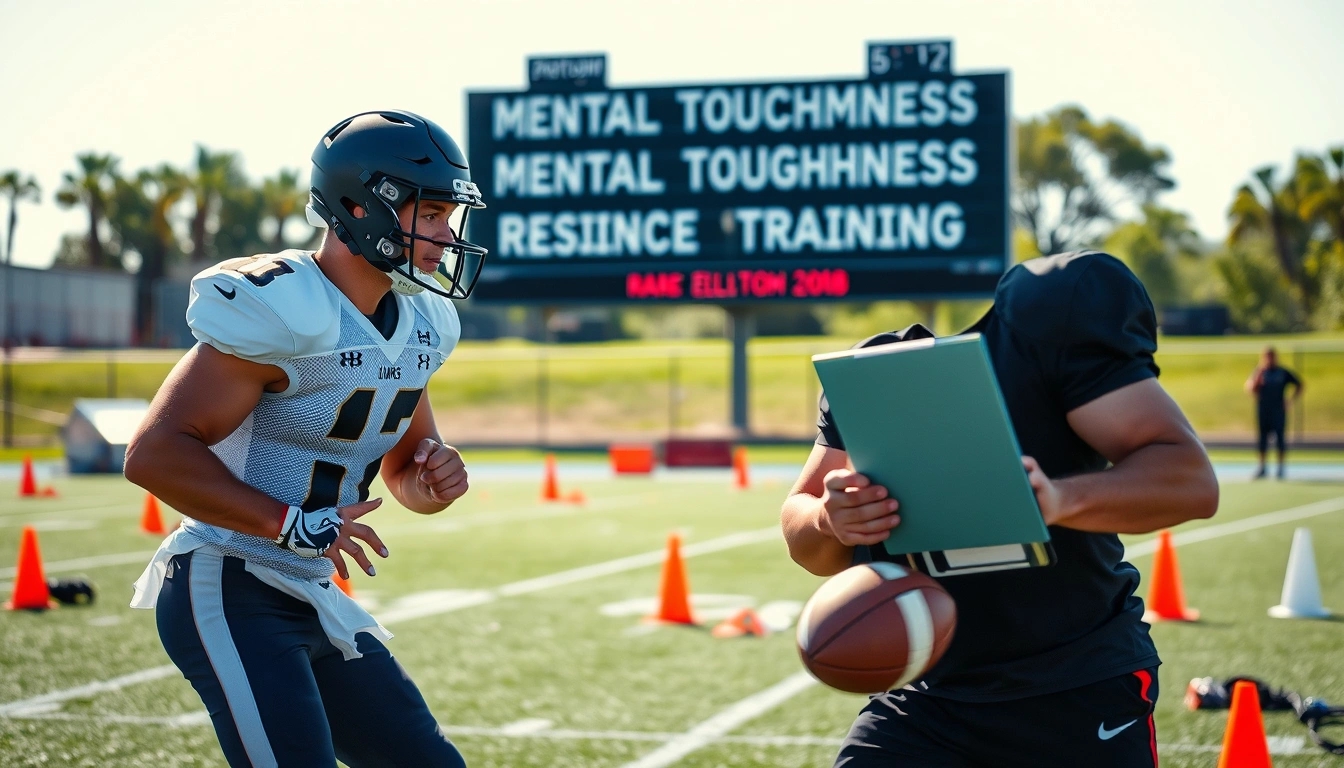Mental toughness in football? Oh, it’s not just some fancy buzzword coaches throw around to sound smart. It’s the real deal—the invisible edge that turns a good player into a legend. You can have all the speed, strength, and skills in the world, but if your mind’s not locked in, you’re toast. So, how do you get this mental grit? Let’s break it down, no fluff, just the raw stuff.
Understanding Mental Toughness in Football
Before you start busting your chops with drills, you gotta understand what mental toughness really means. It’s not about being some emotionless robot. It’s about staying cool when the pressure’s hotter than a summer game under the blazing sun. It’s about pushing through pain, setbacks, and those moments when your brain screams “quit.” Physical strength gets you on the field; mental toughness keeps you there and makes you dominate.
Common Mental Challenges Football Players Face
Here’s the kicker: football isn’t just a physical battle, it’s a mental warzone. From the anxiety of a last-second field goal to the frustration of a nagging injury, players face hurdles that can mess with their heads big time. Ever seen a player choke under pressure? Yeah, that’s mental toughness failing. Or how about the guy who can’t shake off a bad play? That’s mental toughness in need of a tune-up.
| Common Mental Challenges | Impact on Performance |
|---|---|
| Pressure-packed moments | Can cause freezing or panic |
| Injuries | Leads to frustration and loss of confidence |
| Performance slumps | Creates self-doubt and hesitation |
| Team conflicts | Distracts focus and lowers morale |
Training the Mind: Techniques to Build Resilience
Okay, so how do you get tougher mentally? There’s no magic pill, but there are some pretty solid hacks you can try. For starters, visualization isn’t just for hippies or yogis. Picture yourself nailing that touchdown or making that game-saving tackle. Your brain gets a sneak peek, and suddenly, you’re less freaked out when it’s go-time.
- Visualization and Mental Rehearsal: Imagine success vividly. It wires your brain for those clutch moments.
- Mindfulness and Staying Present: Focus on the now, not the screw-ups or what-ifs. Keeps your head clear.
The Role of Coaches and Teammates in Mental Toughness
Don’t kid yourself into thinking you can toughen up solo. Coaches and teammates are like your mental pit crew. They push you, keep you honest, and sometimes drag you back from the brink when your confidence tanks. The vibe of the locker room? Yeah, that’s mental toughness fuel.
Nutrition, Sleep, and Physical Recovery’s Impact on Mental Strength
You can’t outsmart exhaustion or bad habits. Skipping sleep or eating junk? That’s mental fog city. Your brain needs fuel and rest just as much as your muscles do. So, if you want to stay sharp mentally, treat your body right.
| Recovery Factor | Effect on Mental Toughness |
|---|---|
| Quality Sleep | Improves focus and emotional control |
| Balanced Nutrition | Supports brain function and stamina |
| Physical Recovery | Reduces stress and mental fatigue |
Measuring Progress: How to Know You’re Getting Tougher Mentally
Alright, so you’re grinding on the mental game—how do you know it’s working? Look for signs like staying calm under pressure, bouncing back quicker from mistakes, and feeling less rattled by setbacks. Keep a journal or get feedback from coaches and teammates. If you’re improving, it’ll show in your play and your attitude.
Mental toughness isn’t built overnight. It’s messy, frustrating, and sometimes downright painful. But stick with it, and you’ll find yourself not just playing football, but owning it.
Understanding Mental Toughness in Football
Before you lace up your cleats and hit the field, it’s crucial to get what mental toughness really means in football — and trust me, it’s not just about bulking up or running faster. Mental toughness is that gritty, stubborn edge that keeps a player going when the scoreboard’s against them, the crowd’s booing, or the body’s screaming to quit. It’s the invisible muscle that separates the players who just show up from those who show out.
Now, you might think, “Isn’t football all about physical strength and skill?” Sure, those things matter. But without mental toughness, even the strongest athlete can crumble under pressure. It’s like having a Ferrari engine with no driver who knows how to handle it in a storm. On the gridiron, the mind often calls the shots — deciding whether you shrug off a brutal hit or let it shake your confidence, whether you keep grinding after a bad play, or mentally check out.
| Element | Description | Why It Matters |
|---|---|---|
| Resilience | The ability to bounce back from mistakes, injuries, or losses. | Keeps players in the game mentally, no matter what setbacks occur. |
| Focus | Concentrating on the task at hand, ignoring distractions. | Prevents mental errors and helps maintain high performance. |
| Confidence | Belief in one’s own abilities, even when the odds look grim. | Drives risk-taking and aggressive plays that can change the game. |
| Emotional Control | Managing frustration, anger, or anxiety during high-pressure moments. | Ensures decisions are smart, not reactionary or reckless. |
Let’s be honest, mental toughness isn’t some magical trait you’re born with. It’s earned through experience, trial and error, and sometimes a whole lot of pain — both physical and emotional. Think about the last time a quarterback threw an interception and instead of sulking, he came back ready to light up the scoreboard. That’s mental toughness in action. It’s not about being emotionless; it’s about channeling those emotions into fuel rather than letting them blow up your game.
- Why does it matter so much? Because football is unpredictable. One moment you’re on top of the world, the next you’re flat on your back. The mental game keeps you steady.
- It’s a team sport, but mental toughness is personal. Each player faces their own battles — from rookie jitters to veteran slumps.
- Physical strength fades, but mental toughness endures. Injuries, aging, and fatigue hit everyone, but the mind’s resilience can keep performance alive longer.
So, before you jump into mindset drills or pep talks, take a moment to appreciate that mental toughness is the foundation. It’s the secret sauce that keeps players in the game when everything else says “quit.” Without it, even the best plays fall flat. With it? Well, that’s when legends are made.
Common Mental Challenges Football Players Face
Football isn’t just about brute force and lightning-fast reflexes; it’s a mental chess match played at 100 miles per hour. Players face a barrage of psychological obstacles that can seriously mess with their game if they’re not prepared. Let’s be real—whether you’re a rookie or a seasoned pro, the mental grind can hit harder than a linebacker on a blitz.
First off, pressure-packed moments are the bread and butter of football’s mental challenges. Imagine standing on the 1-yard line with seconds ticking down, the crowd roaring, and the weight of your team’s hopes on your shoulders. That’s the kind of pressure that can either make you a legend or leave you frozen like a deer in headlights. It’s not just about staying calm; it’s about channeling that adrenaline and nerves into laser-focused performance. Easier said than done, right?
Then there’s the ugly reality of injuries. Sure, bruises and sprains are part of the game, but the mental toll? That’s a whole different beast. Players often wrestle with frustration, self-doubt, and the fear of never returning to their peak form. The rehab process can feel like an endless uphill battle, testing not just physical endurance but mental grit. And let’s not forget the anxiety about losing your spot on the roster while you’re sidelined.
| Mental Challenge | Impact | Typical Player Response |
|---|---|---|
| High-pressure situations | Increased stress and potential performance anxiety | Freezing, rushing decisions, or heightened focus |
| Injury setbacks | Frustration, fear of re-injury, loss of confidence | Isolation, overthinking, or renewed determination |
| Performance slumps | Diminished self-belief and motivation | Negative self-talk or seeking extra practice |
| Team dynamics & criticism | Feeling isolated or doubted | Withdrawal or increased effort to prove worth |
Speaking of which, performance slumps are another pesky hurdle. Every player hits a rough patch where nothing seems to go right. The ball slips, the timing’s off, and suddenly you’re questioning if you even belong on the field. This mental fog can spiral quickly if not addressed, turning a bad game into a bad season. The trick? Recognizing it early and breaking the cycle before it snowballs.
And don’t get me started on team dynamics and the emotional rollercoaster of locker room politics. Ever felt like you’re the odd one out? Or that the coach’s feedback was a bit too harsh? It happens. Navigating these social minefields requires emotional intelligence and resilience—skills that don’t get nearly enough spotlight but can make or break a player’s mental health.
- Pressure-packed moments: Learn to breathe and trust your training.
- Injuries: Focus on rehab goals, not just the pain.
- Performance slumps: Seek support and keep practicing smartly.
- Team dynamics: Build strong relationships and communicate openly.
In the end, football tests more than muscles and speed—it’s a mental marathon filled with twists, turns, and unexpected hurdles. Players who master these psychological challenges don’t just survive Sunday; they thrive. And hey, if you can keep your head when everything else is losing theirs, you’re already halfway to greatness.

Training the Mind: Techniques to Build Resilience
Alright, here’s the deal — mental toughness in football isn’t just about gritting your teeth and pushing through pain like some kind of robot. Nope, it’s a whole lot messier and way more interesting than that. When the game gets ugly, and trust me, it will, your brain’s gotta be ready to take the hits and keep coming back swinging. So, how do you train your mind to be as tough as your biceps? Let’s break it down with some real-world strategies that players swear by.
- Visualization and Mental Rehearsal: This one’s a classic, but don’t roll your eyes just yet. Imagine yourself nailing that crucial catch or making the game-saving tackle. It sounds simple, but picturing success actually wires your brain for it. Think of it as a mental warm-up that gets your confidence revving before you even hit the field.
- Mindfulness and Staying Present: Ever noticed how your mind can wander to that missed pass from last week or freak out about the next game? Mindfulness is about snapping back to the here and now. Focus on your breathing, the feel of the turf under your cleats, the roar of the crowd. Staying present keeps you from spiraling into doubt or anxiety.
- Self-Talk and Positive Affirmations: The little voice in your head? Yeah, it matters. Replace the “I can’t do this” with “I’ve got this” or “One play at a time.” It’s cheesy, but it works. Your brain believes what you tell it, so make sure you’re giving it the right script.
| Exercise | Purpose | How to Do It |
|---|---|---|
| Pressure Simulation | Builds calm under stress | Practice drills with loud noise or distractions to mimic game pressure |
| Resilience Journaling | Tracks setbacks and comebacks | Write about tough moments and how you overcame them daily |
| Controlled Breathing | Reduces anxiety and improves focus | Inhale for 4 seconds, hold 4, exhale 4, repeat for 5 minutes |
Let’s be honest — bouncing back from setbacks isn’t some neat, linear process. Sometimes you’ll feel like a champ, other times like you’re stuck in quicksand. The key is persistence. Those moments when you want to throw in the towel? That’s exactly when mental toughness is forged. It’s less about never failing and more about refusing to stay down.
Now, don’t get me wrong — no one’s saying you should bottle up your emotions or pretend you’re invincible. Part of mental resilience is acknowledging the frustration, the anger, even the doubts. Then, you use those feelings fuel your comeback rather than letting them drag you under. Coaches and teammates can help here, but at the end of the day, it’s your brain that’s gotta do the heavy lifting.
- Set Realistic Goals: Break down your mental training into bite-sized wins. Maybe it’s staying focused for a whole quarter or shaking off a bad play faster than last time.
- Celebrate Small Victories: Did you manage to calm your nerves before the snap? That’s a win. Mental toughness builds with these little successes stacking up.
So, next time you’re feeling rattled after a tough game or a brutal practice, remember: the mind is a muscle too. Train it with the same dedication you give your body, and you’ll find yourself tougher, sharper, and ready to take on whatever the season throws your way. Because at the end of the day, football is as much a mental battle as it is physical — and winning starts in your head.
Visualization and Mental Rehearsal
Visualization and Mental Rehearsal: Now, let’s get real about this whole “seeing is believing” thing. Imagining success on the football field isn’t just some fluffy, feel-good advice tossed around by coaches to fill time during practice. Nope, it’s actually a hardcore mental workout that preps your brain for the chaos of the game. Think of it like a mental dress rehearsal before the big show. When you picture yourself making that perfect catch or breaking through the defense, your brain starts wiring those pathways as if you were physically doing it. Crazy, right?
- Why it works: Your brain can’t really tell the difference between a vivid mental image and reality. So, by running through plays in your head, you’re essentially training your muscle memory and boosting your confidence without breaking a sweat.
- Confidence boost: When you mentally nail a play beforehand, you’re less likely to freeze up when the pressure’s on. It’s like having a secret weapon tucked away in your helmet.
But don’t get it twisted—visualization isn’t just daydreaming. It’s a focused, deliberate practice that requires you to engage all your senses. Imagine the roar of the crowd, the feel of the turf under your cleats, the sting of the cold air in your lungs. The more real you make it, the better your brain can prepare.
| Step | What to Do | Why It Helps |
|---|---|---|
| 1 | Find a quiet space and close your eyes | Reduces distractions, allowing full focus |
| 2 | Visualize a specific scenario (e.g., scoring a touchdown) | Builds mental familiarity with game situations |
| 3 | Engage all senses (sound, touch, sight) | Enhances realism and brain activation |
| 4 | Repeat regularly, ideally daily | Strengthens neural pathways for better execution |
Now, here’s a little secret: even the pros swear by visualization. Tom Brady, for example, has talked about mentally rehearsing games before stepping on the field. It’s not magic; it’s science. But hey, it’s not always sunshine and touchdowns. Sometimes your mind wanders, or you get that nagging doubt creeping in. That’s normal. The trick is to acknowledge those doubts but keep steering your mental ship back on course.
- Pro tip: Pair visualization with physical practice. The two together? Game changer.
- Common mistake: Skipping the details. The devil’s in the details, folks. The more precise your mental rehearsal, the more it sticks.
To wrap it up, visualization and mental rehearsal aren’t just for the “woo-woo” crowd. They’re practical, proven tools that can give you an edge when the game clock’s ticking down and the pressure’s mounting. So next time you’re warming up, close your eyes for a minute and see yourself owning the field. Your brain—and your team—will thank you for it.
Mindfulness and Staying Present
Alright, let’s cut to the chase: football is a wild beast of a game. One second, you’re crushing it, the next, you’re stuck replaying that boneheaded fumble in your head like a broken record. Here’s the kicker — if you don’t learn to live in the moment, your brain’s gonna drag you down faster than a linebacker blitz. Mindfulness, or simply put, staying present, is the secret weapon many players overlook. It’s about locking your focus on what’s happening right now, not what already happened or what might happen next. Sounds easy? Yeah, tell that to your brain when it’s doing somersaults over a missed tackle.
- Why Staying Present Matters: When your mind wanders to past mistakes, it’s like giving your opponent a free touchdown. You lose sharpness, confidence, and sometimes the whole game slips through your fingers.
- Future Worries? Forget ‘Em: Obsessing over what might go wrong next play? That’s a one-way ticket to anxiety-ville. Staying present helps you keep your cool and react to what’s actually happening, not some imagined disaster.
Now, how do you train your brain to stay in the now? It’s not about meditating for hours or chanting mantras (unless that’s your thing). It’s practical stuff, like focusing on your breathing during breaks, or tuning into the sounds and sights around you to anchor yourself. Here’s a quick table with some easy drills:
| Drill | Purpose | How to Do It |
|---|---|---|
| Breath Counting | Center your attention | Count your breaths in and out slowly for 1-2 minutes |
| 5-4-3-2-1 Grounding | Snap out of distractions | Name 5 things you see, 4 you feel, 3 you hear, 2 you smell, 1 you taste |
| Body Scan | Increase body awareness | Mentally check each body part from head to toe for tension |
But hey, don’t expect to become a mindfulness guru overnight. It’s a bumpy road, and you’ll catch your mind wandering like a lost puppy more times than you care to admit. The trick is to notice when it happens and gently pull yourself back without beating yourself up.
Here’s the real talk: players who master staying present often find their game improves in weird, almost magical ways. The split-second decisions get sharper, nerves chill out, and even the dreaded “what if” moments lose their grip. Plus, it’s not just about football — this skill sneaks into your life off the field, helping with stress, sleep, and just dealing with the chaos of everyday stuff.
Quick Tips to Stay Present During Games:
- Focus on the feel of your cleats on the turf.
- Listen closely to your coach’s instructions or teammates’ calls.
- Keep your eyes on the ball or your immediate assignment.
- Use a simple mantra like “One play at a time” to reset your mind.
In the end, mindfulness isn’t some fluffy, new-age nonsense. It’s a practical, no-BS approach to keep your head in the game and your heart in the fight. So next time your brain starts replaying that botched snap or stressing about the next play, remind yourself: the only play that matters is the one happening right now.
The Role of Coaches and Teammates in Mental Toughness
Mental toughness in football isn’t some magical trait that just pops out of nowhere like a rabbit from a hat. Nope, it’s more like a team effort, a product of the environment players find themselves in every single day. Coaches and teammates? They’re the unsung heroes in this mental game, shaping how players think, react, and ultimately perform when the pressure’s cranked up to eleven.
Think about it—no player, no matter how talented, thrives in a vacuum. The support system around them acts like a mental gym, constantly pushing, pulling, and prodding them to get stronger in the head. Coaches don’t just teach plays or yell from the sidelines; they set the tone for resilience, grit, and focus. When a coach gives honest feedback, even if it stings a bit, it’s like a mental weightlifting session—painful but necessary for growth.
- Feedback as Fuel: Constructive criticism helps players recognize their weaknesses without breaking their spirit.
- Positive Reinforcement: Celebrating small wins builds confidence and encourages persistence.
- Accountability: Coaches hold players responsible, teaching discipline and mental responsibility.
And teammates? They’re the daily dose of motivation, competition, and camaraderie all rolled into one. A locker room full of supportive teammates can be the difference between a player folding under pressure or rising to the occasion. It’s like having a built-in cheer squad, but also a bunch of challengers who won’t let you slack off.
| Team Dynamics | Impact on Mental Toughness |
|---|---|
| Trust and Communication | Builds a safe environment to take risks and learn from mistakes |
| Healthy Competition | Pushes players to improve and stay sharp mentally |
| Shared Goals | Unites players, creating a collective mental resilience |
Now, don’t get me wrong—sometimes the locker room can feel more like a pressure cooker ready to blow. But that’s part of the process. Dealing with conflicts, handling criticism from teammates, and navigating the ups and downs of team culture all contribute to a player’s mental toughness. It’s messy, it’s unpredictable, and yeah, it’s downright frustrating at times. But it’s also real life.
So, next time you hear about a player’s mental toughness, remember it’s not just about their solo grind. It’s about the coaches who push them beyond their limits and the teammates who refuse to let them settle for less. Together, they create a mental fortress that can weather the storms of a brutal football season.
In short, mental toughness is a team sport—no solo acts here.
Nutrition, Sleep, and Physical Recovery’s Impact on Mental Strength
Look, you can’t just hit the gym like a maniac or grind through endless film sessions and expect your brain to keep up if you’re trashing your body’s recovery process. It’s like trying to run a high-performance engine on low-grade fuel — sure, it might sputter along for a bit, but eventually, it’s gonna stall. Mental toughness in football isn’t just about grit and willpower; it’s deeply intertwined with how well you treat your body behind the scenes.
- Nutrition: This is the fuel, the raw material for both your muscles and your mind. Skimp on the good stuff, and your brain fogs up faster than a windshield in a rainstorm. Carbs, proteins, fats — they’re all players in this game. Don’t fall for the “just protein” hype; your brain loves a balanced diet with plenty of antioxidants and omega-3s to keep those neurons firing sharp.
- Sleep: Here’s the kicker — no matter how much you want to power through, your brain needs downtime. Sleep isn’t just about feeling rested; it’s when your brain processes everything from the day’s plays to emotional stress. Miss out on quality sleep, and your decision-making, reaction times, and emotional control take a nosedive.
- Physical Recovery: Ice baths, massages, stretching, rest days — they might seem like luxury, but they’re essentials. Recovery isn’t just about healing muscles; it’s about resetting your nervous system. If you’re dragging around sore and exhausted, your mental stamina won’t last long on the field.
| Recovery Element | Impact on Mental Toughness | Practical Tips |
|---|---|---|
| Nutrition | Enhances brain function, focus, and energy levels | Eat balanced meals with lean proteins, whole grains, and healthy fats; stay hydrated |
| Sleep | Improves memory consolidation, mood regulation, and reaction time | Aim for 7-9 hours nightly; create a consistent sleep routine; avoid screens before bed |
| Physical Recovery | Reduces fatigue and prevents burnout, allowing sustained mental resilience | Incorporate rest days, use foam rolling, and try relaxation techniques like deep breathing |
Now, don’t get me wrong — I get it. Life’s hectic, and sometimes you’re burning the candle at both ends trying to juggle training, work, and a social life (or what’s left of it). But here’s the brutal truth: if you’re skimping on sleep or fueling up on junk food, you’re basically sabotaging your own mental game. Your brain’s gonna be sluggish, your focus will wander, and when the pressure mounts — like that crucial fourth quarter blitz — you’ll be caught flat-footed.
Think of it like this: your body and mind are a tag team. When your body’s wrecked, your mind’s not far behind. And if your mind’s not sharp, no amount of physical training will save you from mental fatigue or poor decision-making. Recovery isn’t a “nice to have” — it’s a non-negotiable part of building mental toughness.
Quick checklist for better mental strength through recovery:
- Prioritize sleep like it’s a championship game — no excuses.
- Eat real food, not just whatever’s quickest or easiest.
- Schedule recovery days and stick to them religiously.
- Listen to your body — if you’re dragging, don’t push through blindly.
- Hydrate like a champ; dehydration is a sneaky mental killer.
At the end of the day, you want to be the player who stays sharp when everyone else is fading. And that starts with respecting the basics: nutrition, sleep, and recovery. Ignore them, and you’re just spinning your wheels. Nail them, and your mental toughness gets a serious upgrade — ready to take on whatever the game throws at you.

Measuring Progress: How to Know You’re Getting Tougher Mentally
Alright, so you’ve been grinding hard on your mental game, putting in the work with visualization, breathing exercises, and all that jazz. But here’s the million-dollar question: how do you really know if your mental toughness is improving? Because let’s be honest, if you can’t put a finger on it, it’s kinda like chasing shadows. You need some solid signs and tools to track your progress, otherwise, you’re just hoping for the best. Spoiler alert: hope doesn’t cut it in football.
First off, self-awareness is your best friend here. Pay attention to how you react in high-pressure moments. Are you still freezing up, or do you find yourself staying calm and focused? That’s a huge red flag or green flag right there. Keep a journal or use a mental toughness app to jot down your feelings and reactions after practices and games. Over time, patterns will emerge.
- Emotional control: Notice if you’re less rattled by mistakes or bad calls.
- Consistency: Are you performing steadily instead of rollercoastering all over the place?
- Recovery speed: How quickly do you bounce back from setbacks?
Now, let’s talk numbers — yeah, mental toughness can be a bit squishy, but you can still quantify some aspects. Take a look at your performance stats under pressure. For example, track completion rates, decision-making speed, or error rates in clutch situations. If those improve, your mind is probably tougher.
| Indicator | What to Track | Why It Matters |
|---|---|---|
| Stress Response | Heart rate variability during games | Lower spikes suggest better control |
| Focus Duration | Time spent fully engaged in drills | Longer focus means stronger mental stamina |
| Emotional Resilience | Self-reported mood post-game | Better mood indicates quicker emotional recovery |
Don’t forget, feedback from coaches and teammates is pure gold. Sometimes you’re too close to see your own progress, but others can spot subtle changes in your attitude and grit. Ask for honest opinions about your mental game—if they say you’re “more composed” or “don’t get tilted as easily,” that’s a win.
Here’s a quick checklist to see if you’re leveling up:
- Do you handle pressure without freaking out?
- Can you shake off mistakes faster than before?
- Are you more confident in your decisions on the field?
- Is your focus sharper during crunch time?
- Do you keep a positive mindset even when things go south?
If you tick most of these boxes, congratulations, you’re on the right track. But remember, mental toughness isn’t a light switch—it’s a slow burn. So don’t sweat a bad day or two. Keep measuring, keep adjusting, and above all, keep showing up.
In the end, if you can’t measure it, you’re flying blind. So grab whatever tools you can—journals, apps, heart rate monitors, honest feedback—and start tracking. Because mental toughness? It’s the game within the game, and you gotta see the scoreboard to know you’re winning.
Frequently Asked Questions
- What exactly is mental toughness in football?
Mental toughness in football is like having an unbreakable shield in your mind. It means staying focused, confident, and resilient no matter the pressure or setbacks. Think of it as the invisible muscle that keeps you pushing forward when the game gets tough.
- How can I start building mental toughness?
Start small! Use visualization to picture yourself succeeding on the field, practice mindfulness to stay present during the game, and embrace challenges as opportunities to grow. It’s like training your brain just like you train your body—consistency is key.
- Why is mental toughness more important than physical strength?
Sure, physical strength gets you in the game, but mental toughness keeps you there and helps you perform at your best under pressure. It’s the difference between folding under stress and rising like a champion when it counts the most.
- How do coaches and teammates influence mental toughness?
They’re your mental pit crew! Coaches provide guidance and motivation, while teammates offer support and constructive feedback. A positive team culture creates an environment where mental toughness can thrive.
- Can nutrition and sleep really affect my mental game?
Absolutely! Your brain needs fuel and rest just like your muscles do. Poor nutrition and lack of sleep can fog your focus and drain your energy, making it harder to stay mentally sharp during the game.
- How do I know if my mental toughness is improving?
Look for signs like staying calm during high-pressure moments, bouncing back quickly from mistakes, and maintaining confidence throughout the game. Tracking these changes is like watching your mental muscles grow stronger over time.
- What are some quick mental exercises I can do before a game?
Try deep breathing to calm nerves, visualize key plays to boost confidence, or repeat positive affirmations to hype yourself up. These quick hacks can flip your mindset from jittery to ready in seconds.













